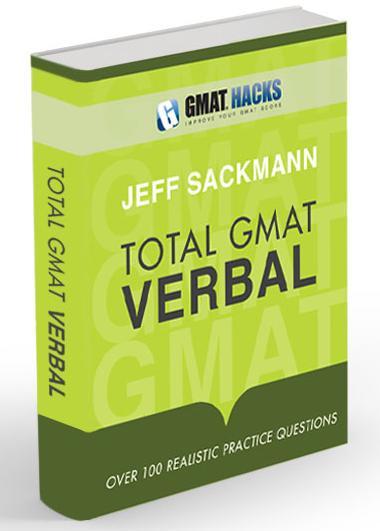
Bookshelf
|
|
Total GMAT Math Jeff's complete Quant guide, on sale now! |
|
|
Total GMAT Verbal Everything you need to ace GMAT Verbal! |
1,800 Practice Math Questions
Buy Jeff's books at Amazon.com

GMAT Official Guide, with IR
OG Math | OG Verbal
OG12 & Quant Rev solutions!
GMAT Question of the Day
Beginner's Guide to the GMAT
GMAT Hacks Affiliate Program

Recent Hacks

Categories
- General Study Tips
- Goals and Planning
- CAT Strategy
- The Mental Game
- GMAT Math Strategy
- GMAT Math Topics
- Mental Math
- Data Sufficiency
- Critical Reasoning
- Reading Comprehension
- Sentence Correction
- Analytical Writing Assessment
- Integrated Reasoning
- IR Explained
- Business School Admissions
- GMAT Prep Resources
- Practice Questions
- Total GMAT Math
- Total GMAT Verbal
- GMAT 111

Be Careful With "Only"
January 17, 2011
| You should follow me on Twitter. While you're at it, take a moment to subscribe to GMAT Hacks via RSS or Email. |
One of the most misused words in the English language is "only." Your friends and coworkers won't even notice when you place "only" in the wrong grammatical position, but GMAT Sentence Correction expects you to avoid those mistakes.
In a general sense, it's best to think of "only" as a modifier. Place it next to a subject, and you know more about that subject. For instance, instead of saying, "I have seven questions remaining," you might say, "I have only seven questions remaining." By modifying "seven" with "only," you're adding meaning.
Note that "only" comes after the verb ("have") and before the subject ("seven questions"). Now consider an alternative: "I only have seven questions remaining." That probably sounds acceptable, since placing "only" before the verb is the most common mistake related to this word.
Verb, "only," subject
We've grown to accept the misuse of "only," so we've forgotten what it means to place "only" before the verb. This is a little difficult to explain, so you may need to re-read the following a couple of times.
When we modify a subject with "only," we're saying that that subject is "all there is." Let's reconsider the above two examples and try to translate them.
- I have only seven questions remaining (correct)
Modification: "Only" modifies "seven questions."
Translation: All that's remaining is seven questions. There isn't an eighth question or a twentieth question. - I only have seven questions remaining (incorrect)
Modification: "Only" modifies "have."
Translation: All there is is "having" the seven questions; I won't eat the questions or live the questions or [any other verb] the questions.
The second example is tough to understand because it doesn't mean anything that we might want to express. In rare cases, we may want to place "only" before a verb. For instance, if you're not hungry, you might say, "I'm only drinking tonight" to indicate that you are not eating as well.
At a bare minimum, pay close attention to the word "only" when it appears in Sentence Correction questions and answers. With practice, you'll learn to parse the (sometimes senseless) meaning no matter where "only" is placed.
About the author: Jeff Sackmann has written many GMAT preparation books, including the popular Total GMAT Math, Total GMAT Verbal, and GMAT 111. He has also created explanations for problems in The Official Guide, as well as 1,800 practice GMAT math questions.
 |
Total GMAT Verbal
The comprehensive guide to the GMAT Verbal section. Recognize, dissect, and master every question type
you'll face on the test. Everything you need, all in one place, including 100+ realistic practice questions. |